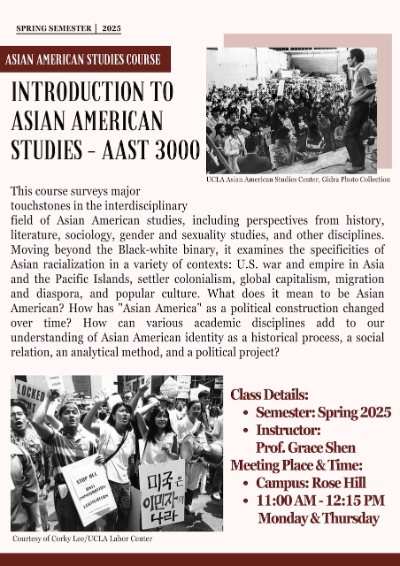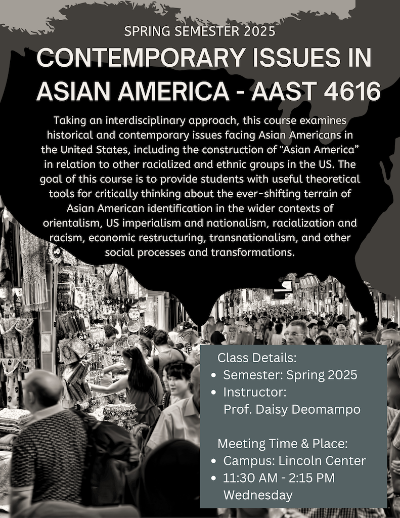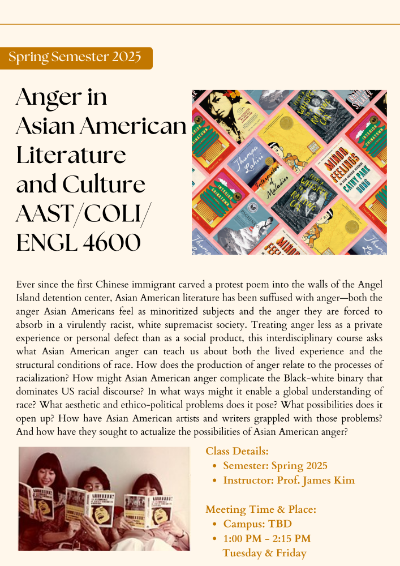Asian American Studies Courses
The Asian American Studies minor requires six courses.
Course offerings for AY 2024-25
Spring 2025 Courses:
Introduction to Asian American Studies - AAST 3000
Campus: Lincoln Center
Instructor: Grace Shen
Time: 10:00 - 11:15 a.m.
Days: Mondays and Thursdays
Campus: Rose Hill
Instructor: Nicholas Eppert
Time: 11:30a.m. - 12:45p.m.
Days: Mondays and Thursdays
This course surveys major touchstones in the interdisciplinary field of Asian American studies, including perspectives from history, literature, sociology, gender and sexuality studies, and other disciplines. Moving beyond the Black-white binary, it examines the specificities of Asian racialization in a variety of contexts: U.S. war and empire in Asia and the Pacific Islands, settler colonialism, global capitalism, migration and diaspora, and popular culture. What does it mean to be Asian American? How has “Asian America” as a political construction changed overtime? How can various academic disciplines add to our understanding of Asian American identity as a historical process, a social relation, an analytical method, and a political project?



Previous course offerings
SPRING 2024
AAST 3000: Introduction to Asian American Studies (Dr. Stephen Hong Sohn) - LC campus
This course surveys major touchstones in the interdisciplinary field of Asian American studies, including perspectives from history, literature, sociology, gender and sexuality studies, and other disciplines. Moving beyond the Black-white binary, it examines the specificities of Asian racialization in a variety of contexts: U.S. war and empire in Asia and the Pacific Islands, settler colonialism, global capitalism, migration and diaspora, and popular culture. What does it mean to be Asian American? How has "Asian America" as a political construction changed over time? How can various academic disciplines add to our understanding of Asian American identity as a historical process, a social relation, an analytical method, and a political project?
AAST 2528: Asian American Art (Dr. Caitlin Meehye Beach) - LC campus
What does it mean to study “Asian American art”? Although the term Asian American is itself relatively new, having emerged through activist movements in the 1960s, work by artists of Asian descent has long circulated in the Americas, from the 1565 opening of the Manila-Acapulco Galleon trade onward. This class explores the diverse histories of Asian American art in what is now known as the United States, across a range of topics and themes, including mercantile trade networks and “export art”; immigration, exclusion, and diaspora; Orientalism; World’s Fairs; modernism, abstraction, and postmodernism; and popular culture. Throughout, we will pay special attention to the work of Asian American artists in New York, both historical and contemporary, with visits to museums, galleries, and studios in the city.
AAST 4616 Contemporary Issues in Asian America (Dr. Daisy Deomampo) - RH campus
This course examines historical and contemporary issues facing Asian Americans from the 1960s to the contemporary moment. By drawing on empirical and ethnographic studies, the course will illuminate Asian Pacific American experiences in the U.S. and globally. Major themes include race, class, gender, sexuality, marriage/family, health, aging, work, and transnationalism.
FALL 2023
49879 COMC 3280-R01
Dr. Qun Wang
Representing Asians in Journalism and Media (4 credits)
Wednesdays, 11:30-2:15
From traditional media to social media, from the “yellow peril” stereotype in the 19th century and the model minority discourse in the 20th century to the Atlanta shootings and the #StopAsianHate during the COVID-19 pandemic in the 21st century, the media have played and continue to play an important role in the history of Asian Americans. Media activities, whether in the processes of media production, representation, or consumption, have largely shaped how the Asian American identity is perceived and how the Asian American community is evolving. At the same time, Asian Americans have become media producers themselves, using both traditional and digital media to tell their stories. Through class materials, discussions, and projects, this course provides an opportunity for students to study the roles and practices involving various media types, such as news media, popular media, and digital media, as well as their implications for Asian Americans. Students will learn topics related to journalism, media, and Asian Americans across such fields as journalism studies, media and communication, historical research, and cultural studies, and will have the opportunity to practice different research methods. (Core attributes: PLUR. Other attributes: AAST, CELP, CMST, COMC, DTEM, JETH, JOUR, JPLH.)
50135 ENGL 3647-R01
Dr. Stephen Hong Sohn
Seeing Stories: Reading Race and Graphic Narratives (4 credits)
TF, 2:30-3:45
This course reveals how American writers of color (Asian American, Native American, African American, Latinx, etc.) have transformed the genre of the graphic narrative to speak to issues of racial difference and social inequality. How do these authors both entertain us and push us to engage in rigorous, critical interpretations of their wildly fanciful texts? Some potential course selections include: Thi Bui’s The Best We Could Do, Kyle Baker’s Nat Turner, Mira Jacob’s Good Talk, Lila Quintero Weaver’s Darkroom, and Jonathan Nelson’s The Wool of Jonesy. (Core attributes: ALC, EP3, PLUR. Other attributes: AAST, ACUP, ADVD, AMST, ASLT, ENRJ, LALS, LAHA, PJRC, PJST.)
49826 THEO 3130-R01
Dr. Ki-Eun Jang
Bible as Migration Literature: Then and Now (4 credits)
MR, 2:30-3:45
The migration experience—whether voluntary or forced—runs through biblical literature. This course approaches the Bible as migration literature, exploring its engagement with the themes of immigration, emigration, exile, multilingualism, diaspora, alien, lawful belonging and un-belonging, refugee, empire, return migration, generational conflict, and identity negotiation. In addition to pluralistic ancient Mediterranean contexts that produced the Bible and ancient Jewish and Christian experiences of migration, this course will explore modern responses to and engagements with the Bible by migrant communities across the globe in the formation and 2 reformation of global Christianity. Special attention will be given to topics in racial and ethnic minority migrant communities in America—such as receptions of the Bible in contesting immigration and building and maintaining contemporary migrant faith communities. (Core attributes: EP3, GLBL, STXT. Other attributes: AASR.)